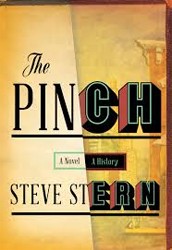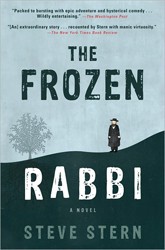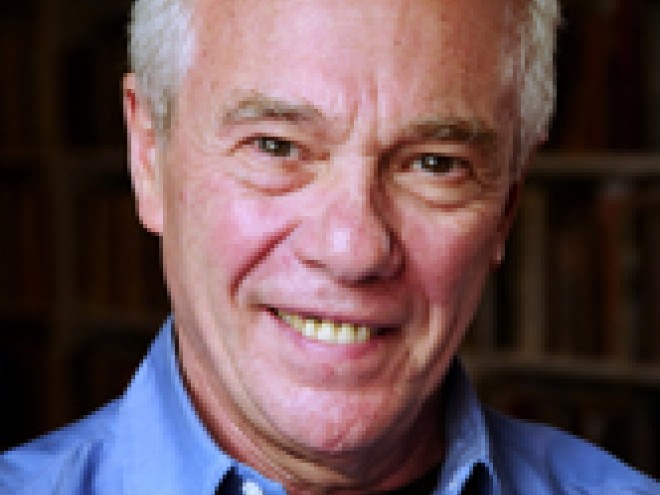
Award-winning author Steve Stern’s eleventh work of fiction, The Pinch: A History/A Novel, was published in June 2016 by Graywolf Press. Jewish Book Council sat down with the prolific author to discuss the role of Jewish history and Yiddish folktales in his writing, race in the South, and the power of comical writing and its significance.
Beth Kissileff: I love when authors take characters and ideas from their other books and continue to use them in different ways in newer books. The Shpinkers appear in other works of yours, and you have written about tightrope walkers in the past, too. What does it mean to you to write this way?
Steve Stern: You make me sound very ecological, recycling characters in order to create a kind of sustainable fiction. The truth is, I’ve been mining the old North Memphis neighborhood of the Pinch for stories for about three decades now, and it’s only natural that some of the narratives dovetail, causing characters who appear in one story to reappear in another. It is, after all, a finite neighborhood, though the stories are infinite; so while I might introduce new characters to the mix, they’re bound to rub shoulders with the veteran populace, and the friction of their shoulder-rubbing can be radically transformative for both old and new residents of the neighborhood.
BK: Can you talk about the interplay of history and fiction in your writing?
SS: The Pinch ends with the Angel of History: Walter Benjamin’s concept inspired by Paul Klee’s painting Angelus Novus in which the angel looks toward the past while being driven ever forward, perhaps catastrophically, in its flight. If you’re looking backward — toward a mythic past, toward the paradise you knew before the Angel of Forgetfulness tweaked you under the nose at birth — then history is something you blindly collide with. I suppose that’s as good a characterization of the attitude in which I write as any: history always manifests itself as an inescapable intrusion, the nightmare from which Joyce’s Stephen Dedalus was trying to awake. In their sleepwalking, my characters often try to sustain themselves on dreams, and since the dreams are frequently nourished by ancient mythologies, they may assume their own palpable reality. What happens when that reality, in which magic is a natural component, encounters the harsh truths of history is a constant theme in the stories I imagine. Though to be honest, the angel at the end of The Pinch evokes not so much Benjamin’s Angel of History as the one with the flaming sword who prohibits Adam and Eve from returning to the Garden.
BK: One of the many lovely things in the book is the honest appraisal of race relations. Can you say something about the role of race in the novel, and the particular one of Jews and blacks in the South?
SS: In my hometown of Memphis, a predominantly black city, there was an interesting symbiosis between African-Americans and Jews. Beale Street, which was the black Main Street of the South for decades, had at one end a cluster of Jewish pawnshops and discount stores. Where blacks were barred from shopping at the white-owned businesses, they were welcomed by the Jews. I won’t pretend this was without its mercenary motive, but still: Schwab’s Emporium featured hoodoo love potions and pomades; Novak’s Pawn accepted toothpicks and thimbles from the gamblers and high-rollers, confident of a considerable return on their investment. The black heritage of Memphis, the city’s richest cultural heritage, had from its early inception a lively Jewish element, and it was through an interest in that hybrid circumstance that I, somewhat ironically, came to know something about the local Jewish history. I guess that, growing up in the South, I always conceived parallels between the black and the Jewish experience, and I’ve been drawn back repeatedly to that perception since I began to write. In The Pinch, I wanted to address the city’s pivotal (even terminal?) historic moment, the garbage strike that preceded the assassination of Martin Luther King. There seemed to me a kind of inevitability in the fact that the so-called urban renewal that destroyed North Main Street coincided with the murder of Dr. King. My dream district evaporated forever with the death of the century’s greatest dreamer.
BK: Can you talk a bit about your sources — folklore, midrash, Yiddish words? How did you do the research for the many worlds this book contains?
SS: I’m never really aware of research per se, since the place where I spend most of my time is in a literary latitude (my room) defined by the kinds of texts you mention. The Book is of course the Torah, whose narrative begins in timelessness before entering history. The vast literature that Torah has generated — midrash, aggadah, folklore, legend, and so much of Yiddish fiction — partakes of both worlds; these are tales that exist comfortably in both a mythic and historic dimension. Characters, such as the folk persona of the prophet Elijah, commute between these worlds with relative ease; creatures such as golems and assorted monsters, the Leviathan and the giant Ziz bird, phenomena such as dybbuks, wandering souls, hidden saints, and all the fabulous demonic and angelic denizens of Kabbalah, can enter the familiar world without substantially altering its fabric. Rabbis and fools can stumble into sitra achra, the malevolent Other Side, and return to their study house unscathed. For centuries the two worlds cohabited more or less peacefully in the Jewish universe. But in our epoch there was a rupture — i.e. a Holocaust — which separated us from the timeless realm and marooned us here under the unforgiving dominion of history. I believe, however, that stories can still retain an echo of the original source, and that the echo can sometimes toll louder than the tale at hand; that the music of that tolling can endow our historical moment with a measure of eternity. I believe a writer, according to his or her means, ought to aspire to capture that music in his or her stories.
BK: In your book, we watch a character write and control the faces of others. Can you talk about the power of writing and its effect on your own life?
SS: I gave The Pinch two endings — one a speculative conclusion in which the book that the character Muni has written plays a crucial part in the revitalization of the lost neighborhood. In the second ending — spoiler alert — Muni’s book is destroyed, and Lenny, my feckless semi-hero, who’s been living both inside and outside of Muni’s chronicle, is set free, though his emancipation is an ambiguous affair. This is what I love most about fiction: that you can have it both ways. You can rectify and redeem botched lives, dissolve the claustrophobia of routine with mad invention, realize the impossible despite the hegemony of the literal; and you can do it all without subverting the accepted wisdom. But I’m not entirely a fool; I know that there’s such a thing as normative reality and that in most lives it trumps whatever the imagination can conceive. There’s a Kafka parable that says we are free and secure citizens of the world, for we’re fettered to a chain long enough to give us the freedom of all earthly space; that we’re free and secure citizens of heaven as well, since we’re also fettered by a similarly long heavenly chain. But if we head for earth, the heavenly collar throttles us, and likewise the earthly collar if we head for heaven. Yet, says Kafka, all the possibilities are ours. Stories are perhaps an effort to break those chains, and if they ultimately fail to do so, well, the energy and passion expended in the attempt allows us to feel, if only vicariously, intensely alive.
BK: Can you talk about the sense of creation and transmission in writing, and what you hope to hand over to readers?
SS: A writer’s characters embody his obsessions, and many of mine are possessed by stories, both their own and those of others, which they’re as driven as the Ancient Mariner to exorcise themselves of. That’s certainly the case with my character Muni Pinsker. George Steiner once said of the Jews that the Book is their homeland, which is a literal truth for me, though the book in question — apostate that I am — is usually the one I’m writing, and home paradoxically the place I hope the writing will take me to. It’s less a straight-ahead voyage, however, than the efforts of a desperate survivor of shipwreck to reach dry land, my desk the lifebuoy I cling to like Ishmael (another mariner) hanging onto Queequeg’s casket. That’s the only way I know to stay afloat. A career sadsack, I nevertheless like to think that I’m essentially a comic writer. Sure, I’ve got my sober and somber themes, which I return to again and again, hammer and tongs. But in the end, though reviewers might beg to differ, my intention is to entertain. I have a religious faith in the power of laughter to clarify a spiritual vision. The old proverb says that aggadah, the narrative imagination, has a laughing face. That’s the compass by which (straddling the casket) I try to navigate my stories.
Beth Kissileff is in the process of fundraising and writing grants to develop a program to assist rabbis of all denominations with writing and publishing books. Kissileff is a rabbinic spouse and author of the novel Questioning Return as well as editor of the anthology Reading Genesis: Beginings.



